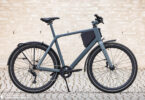When did Apple AirPods, Lacoste sweatshirts and ebikes become the must-haves of today’s youth? We joined what must be the world’s first urban eMTB crew on the streets of Stuttgart to get to grips with the intricacies of Gen Z and unpick the future of urban mobility.
“Things were better before.” An assertion that older generations might valiantly try to defend but instead is often a sign of not quite understanding the world and how it’s changing, expressing a longing to go back to the more familiar. When it comes to Gen Z – those born around or after the turn of millennium – it’s usually uttered by exasperated parents or desperate HR managers. But, there are many things to learn from the next generation, particularly here in Stuttgart.
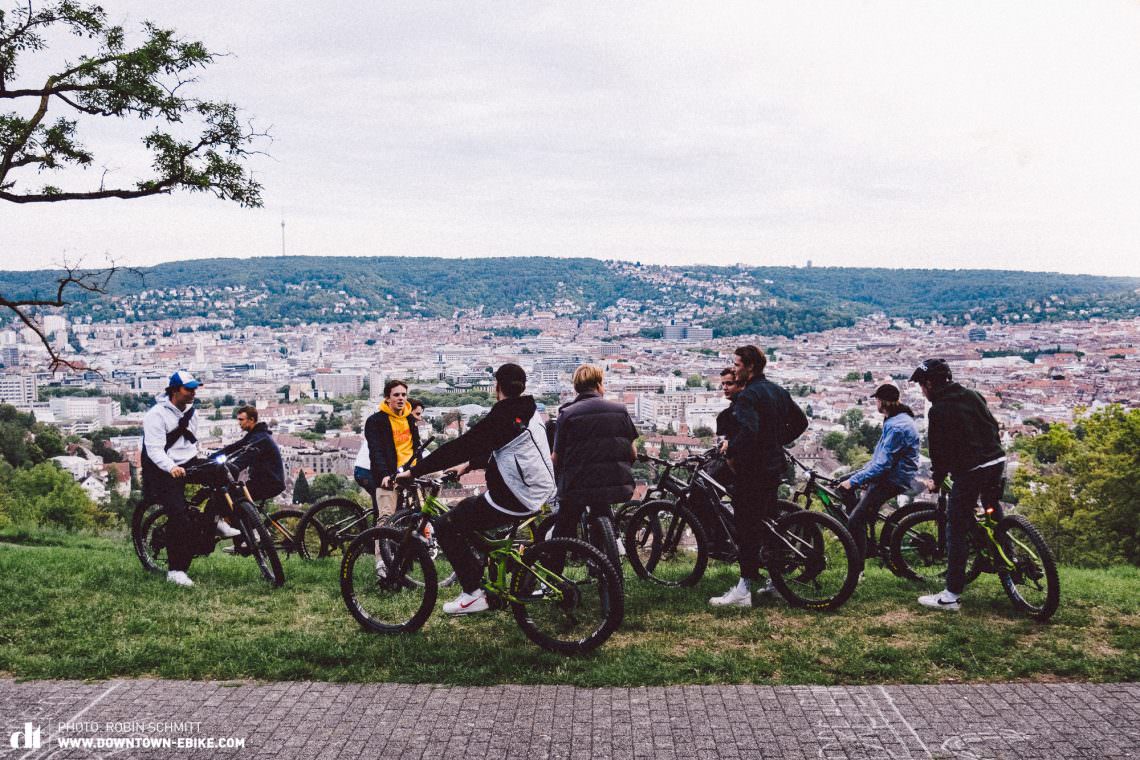
In the global capital of the automotive industry, the birthplace of cars and the hometown of Daimler and Porsche, there’s something bubbling beneath the surface. There’s a new sort of youth culture on the horizon – one with bikes at its core, or, more specifically, eMTBs. And it’s not just a passing fad, because the bikes are so damn practical.
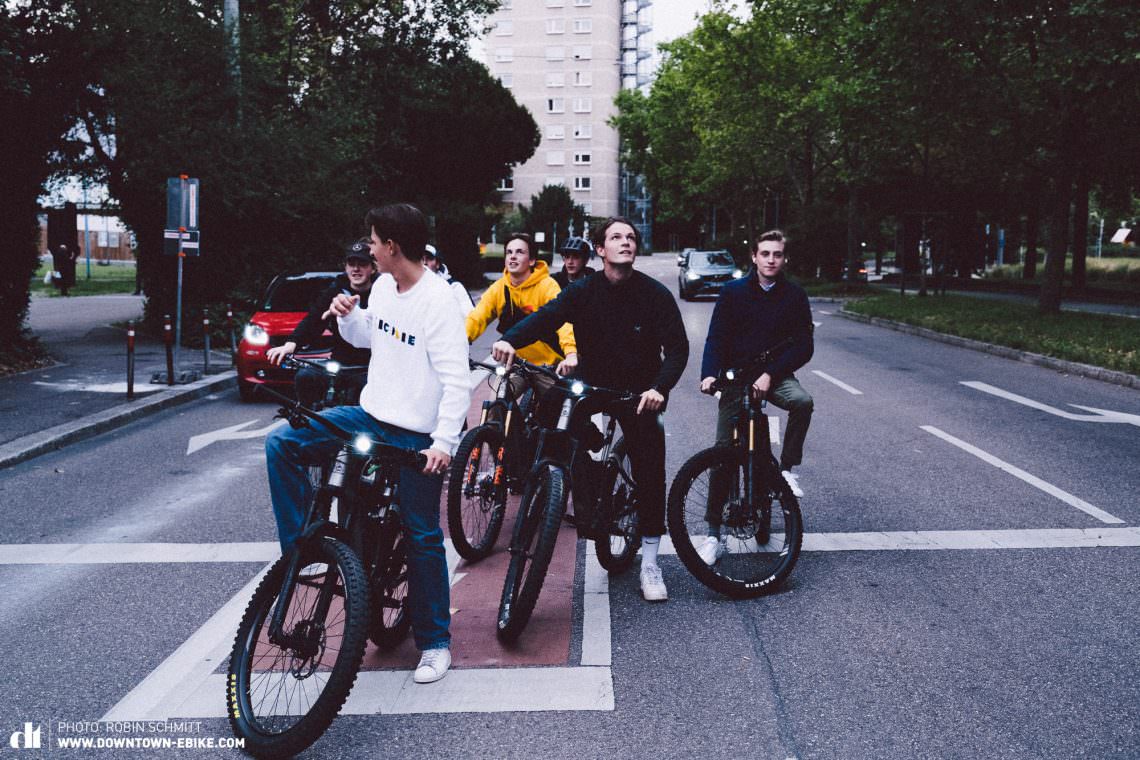


E-SUVs as the solution for urban mobility?
You can count about twenty members that form what is likely the first urban eMTB crew in existence. Most of them turn up on MERIDA eONE-SIXTY eMTBs, which could easily lead you to think they are the sorts of lifelong riders that grew up shredding local woods and sprinting for road signs. But before this crew came together, most of them didn’t even own a bike. Something about ebikes caught their attention. Something about how they ride and how practical they are. Could it be because only a minority of the crew have driving licenses? Out of the ten that we join on this ride, only two have that preciously perceived piece of plastic. For them it’s straightforward: you just don’t need a car in the city.
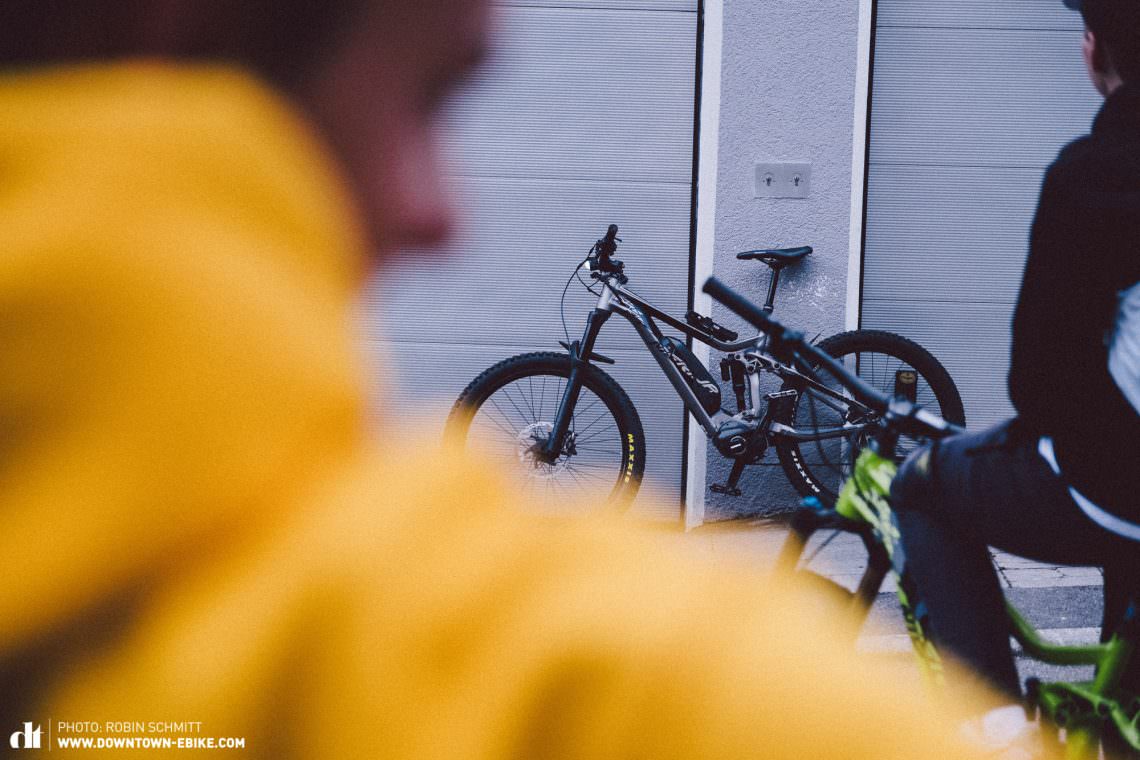
“Our ebikes can replace everything you’d use in the city – cars, buses, trains and the underground. In under ten minutes you can get anywhere you want in Stuttgart and park wherever you like. What else lets you do that?’ says Lorenz matter-of-factly, a crew member known for always taking the most direct route, skirting alleyways, one-way streets, and bossing it down and up stairs. One of the earliest to this urban eMTB scene, the 19-year-old has been riding ebikes for three years, covering around 6,000 km annually. Yep, that’s a lot!
Our ebikes can replace everything you’d use in the city – cars, buses, trains and the underground. In under ten minutes you can get anywhere you want in Stuttgart and park wherever you like. What else lets you do that?
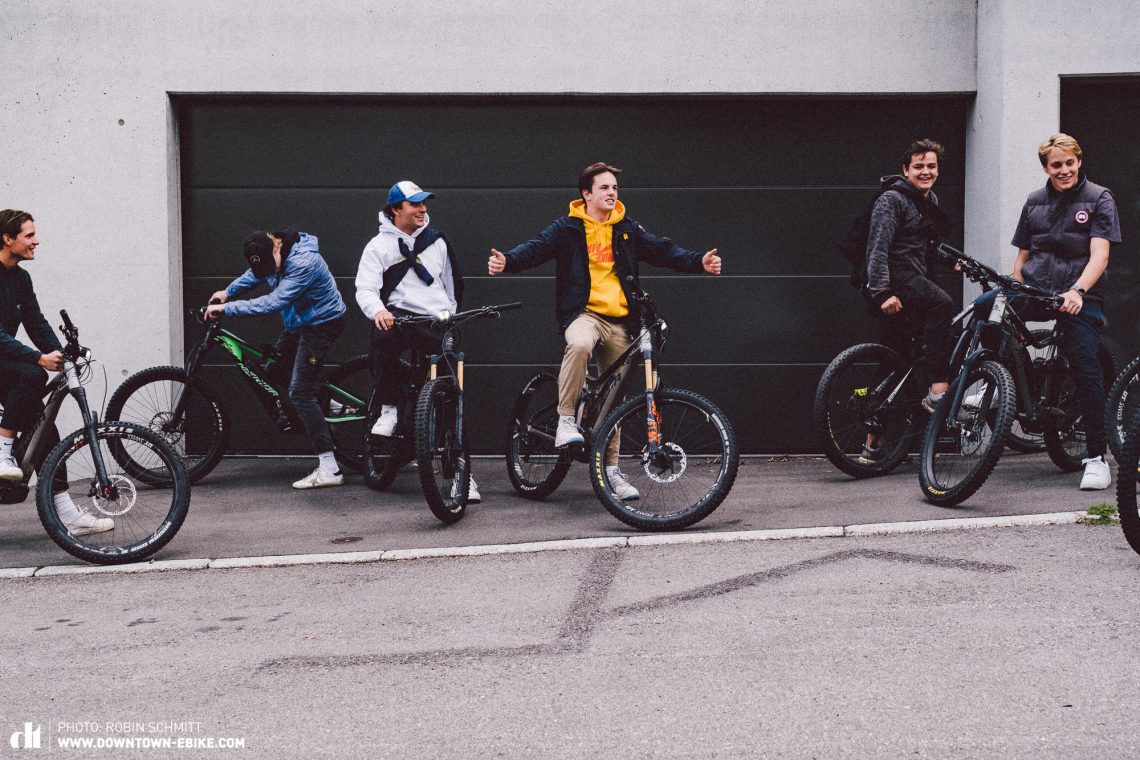
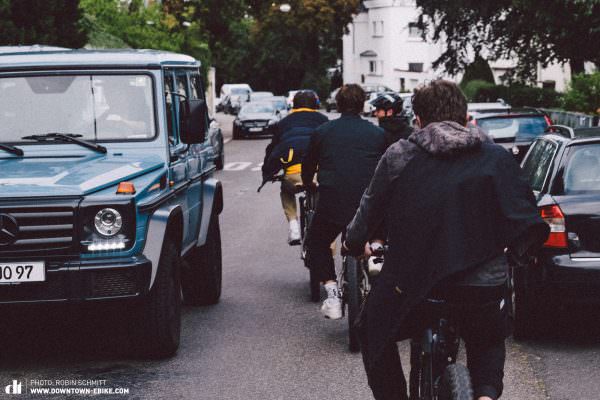
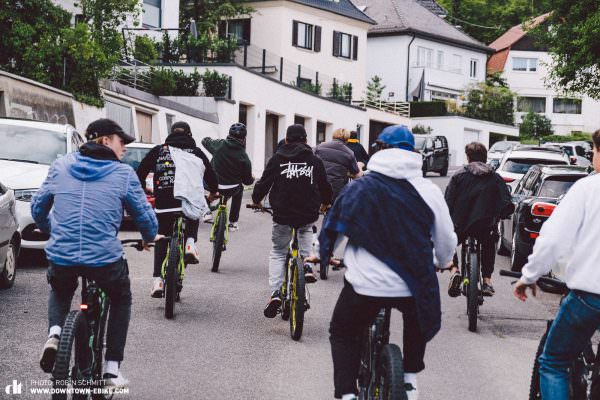
To a certain extent, eMTBs represent the two-wheeled equivalent of an SUV, just being much more practical, quicker, sustainable, quieter, fun, and space-saving for the city. While they won’t work for your weekly grocery shop or to transport the whole family from place to place, an eMTB can still substitute the car for most city-wide, one-person journeys. If all ten crew members had opted to drive to the pizzeria on this given evening, they’d have taken up 120 square metres for parking, whereas four square metres is enough for all their ebikes. It’s eye-opening. Is it down to Gen Z to demonstrate how urban mobility in the future should look? Should the world be looking at how to solve the overcrowding of our roads and parking problems through their eyes?
The crew are pragmatic when it comes to adverse conditions. If you don’t feel like donning rain jackets and waterproof trousers (which they are used to doing) why not stay at home, kick back and connect online? That’s what FaceTime and WhatsApp are there for, right? The crew weigh up the importance of meeting a certain someone or doing a certain thing. Can it wait? What are the alternatives? Openness and flexibility reign: when it comes to doing things at the right time, the crew are confident in the decisions they make. Sure, it doesn’t always work out but if you have a 50% success rate then that’s got to be considered a partial win for the climate, the city and the world as a whole.
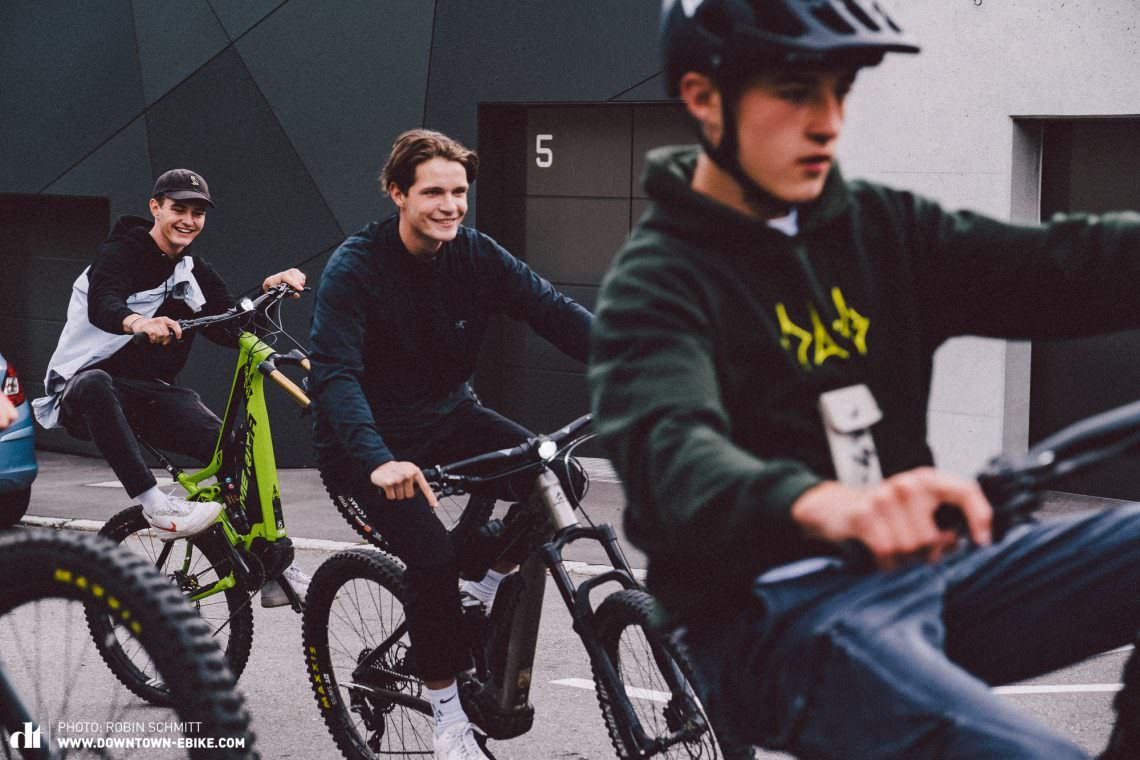
So far the exception for the Stuttgarter eMTB Gang.
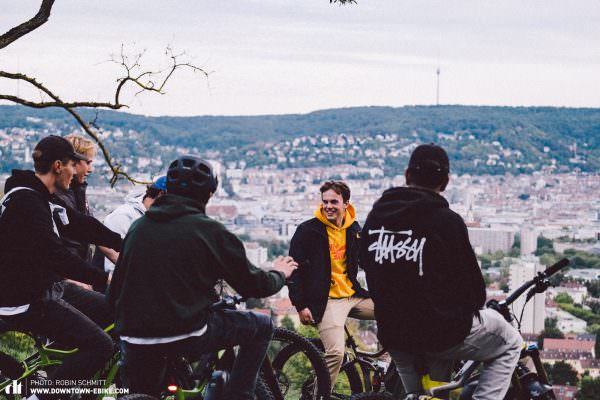
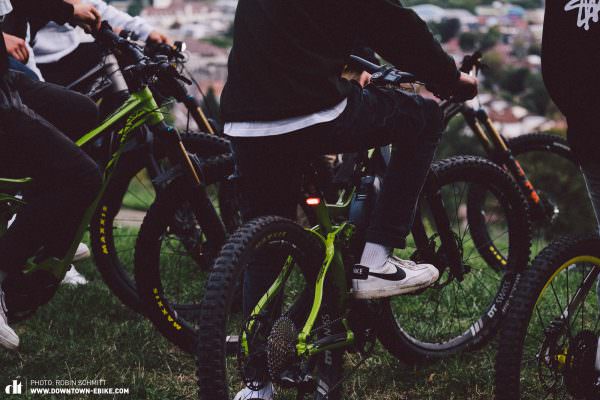
“Why don’t you try and make more out of yourself?”
Fewer parties, less sex, less alcohol, less rule-breaking, fewer career goals, less professional independence, worse economic survival instinct – for the hypercognitive Gen Z, there’s a sweeping list of characteristics that are said to define this cohort, so used to the information overload that they have grown up with. Older generations accuse them of being directionless or void of ambition. But the new generation are a long way removed from that: they prioritise a search for truth through community and social values above anti-establishment ideology or drinking to excess. You can’t measure their goals in KPIs or performance indicators like profit margins or sales growth. Marc Goergen summed it up succinctly in Der Stern, stating,“[Gen Z’s aims] aren’t just about beautifying their CVs, but also changing the world.” In the book Generation Greta, Klaus Hurrelmann and Erik Albrecht echo his thoughts, while Prof. Christian Scholz penned the following in an article in Human Resources Manager, “Despite various differentiations, Generation Z are primarily concerned with leisure time over careers and families over company cars – even if some of them do not yet have a family of their own. This new generation has realised that the dreams of the elderly rarely come true.”

Miscommunication: when generations collide
Why are Gen Zers turning their backs on a meritocratic society? Has it been sparked by a childhood spent on the sidelines of their parents’ stressful lifestyles? They’ve been subjected to information and choice overload ever since they were born thanks to the constant presence of smartphones, the internet and social networks. According to research, this excessive exposure can lead to feelings of powerlessness or loss of direction. Schools aren’t in a position to teach how to deal with today’s information-heavy bombardment or how to question the news, yet these are skills that, for today’s youth, are key. Instead they’re still learning how we’ve always been taught to learn, churning through facts from textbooks with post-it notes to learn by rote. Get to grips with a situation by yourself? No chance. With this in mind, it’s a miracle they aren’t actually anywhere near as lost as we allege. Put into schools and everyday surroundings that are not in harmony with the world’s current technological, economic, social and cultural challenges, it would be entirely justified. Those who cry that, “Everything was better before,” blithely overlook the need to grasp current challenges and rise to the future. Right now, society is short of a vision but has an excess of fear – a sentiment that’s only heightened by the current pandemic.
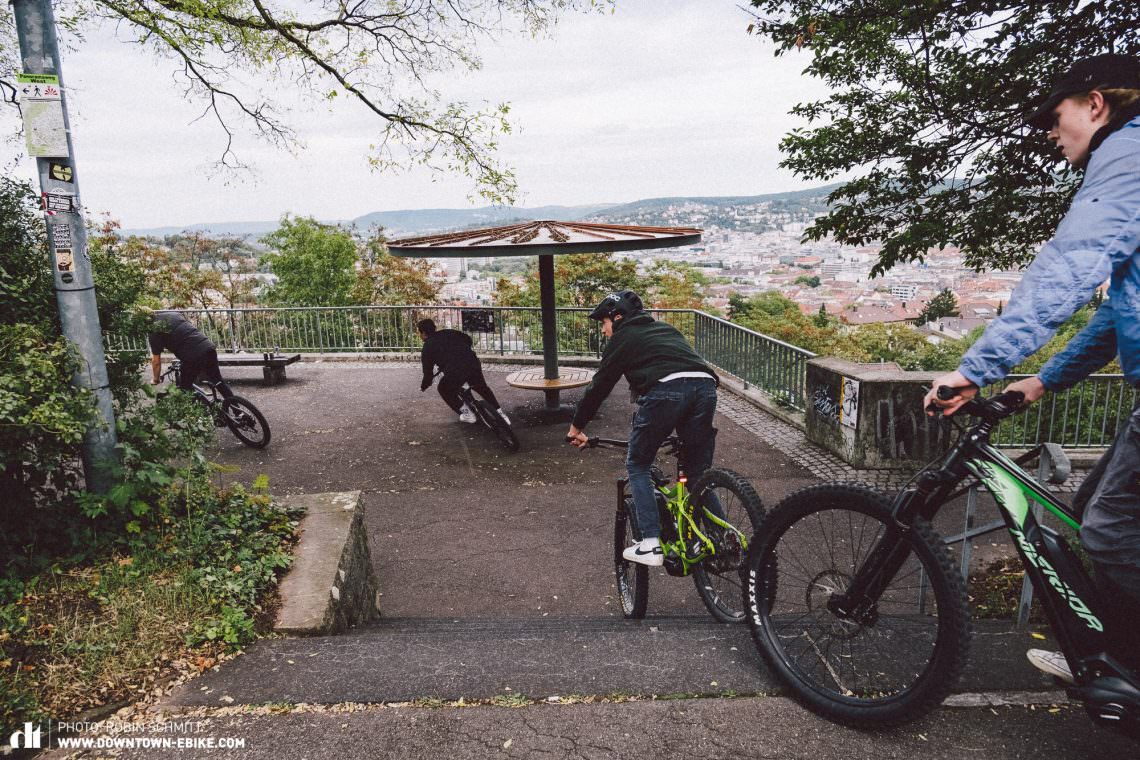
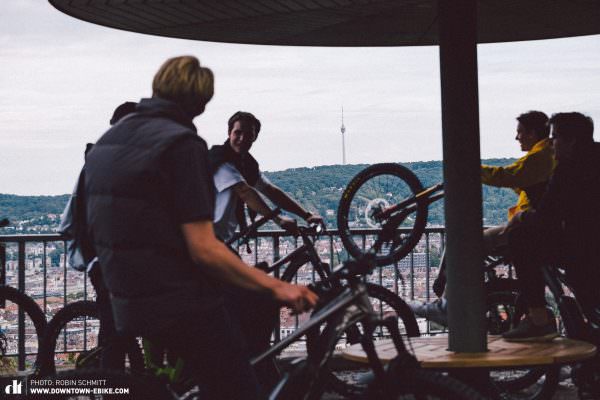
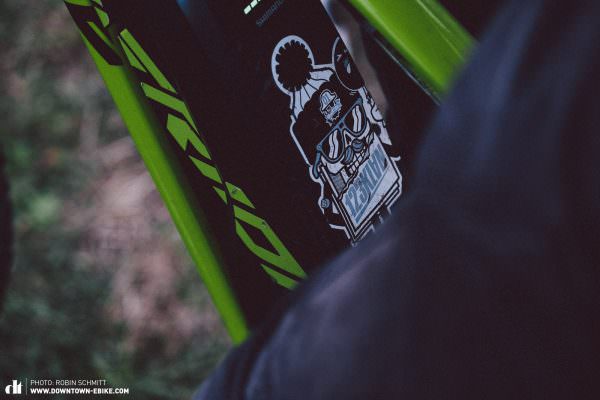
Our heartfelt condolences go out to the family of Michael, owner of E-Radwerk, who recently passed away. He helped many of the kids to buy their bikes. Not just a catalyst, he was a friend to many of the ebike crew members.
Trends and anti-trends – chilling out in boost mode!
Every trend causes an anti-trend. Urbanisation has been countered by the drive to get out into nature, or slow down in the city. The pressure and expectation to perform in fast-paced lives – especially for Gen Zers with a packed schedule – is countered by the need to just be. They prefer to hang out with close friends, previously playing PlayStation but now also, maybe, just maybe, riding ebikes. And in the process, they might casually solve some of the world’s problems!



If you didn’t have an ebike, you couldn’t hang out with us any longer. Gradually more and more of us got an eONE-SIXTY. Then younger siblings, then parents, then basically everyone in our friend circle got an ebike too.
Apple, Lacoste or MERIDA? The blessing and the curse of brands
But as the crew are finding out, not all that glitters is gold. There’s a pressure to appear clad in the right brands and it’s one that’s intensified over the past decade. Is this a trait inherent to all of Gen Z, who have grown up presenting a curated image on social media and have become dependent on likes? Either way, it has a price. Without cash, or in this case, the right ebike, it might feel out of reach to join the crew. “If you didn’t have an ebike, you couldn’t hang out with us any longer. Gradually more and more of us got an eONE-SIXTY. Then younger siblings, then parents, then basically everyone in our friend circle got an ebike too,” Lorenz gestures around the bunch, explaining how the eMTB crew came into existence and how it could basically be dubbed the MERIDA crew too.
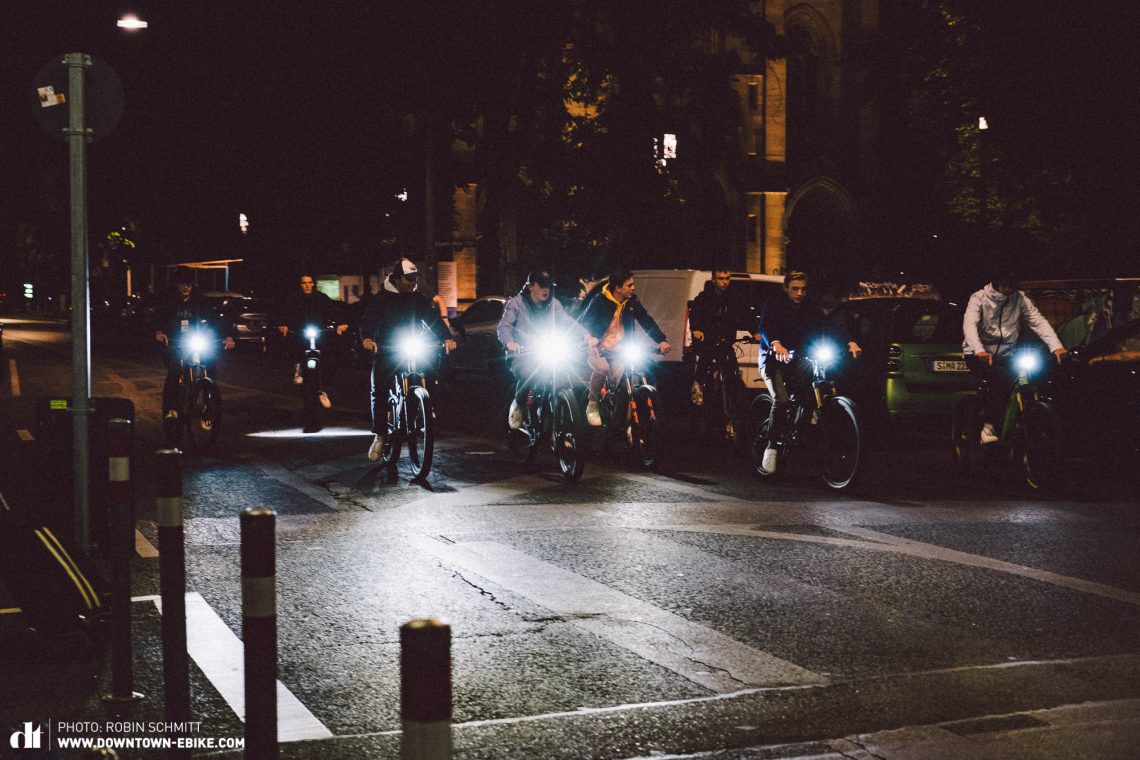
While trails and gnar aren’t the chosen terrain of the crew, they’re all well versed in tech talk. Right now, there’s a buzz around the new Shimano motor and how much power it produces. The curiosity from one of the group is quickly rebutted as another responds, “It doesn’t even matter. What use is the most powerful motor if you can’t put the power down on the roads, or your battery is too small?” They’re clearly in their element, bickering lightheartedly over technical stats, but they all agree on one thing: the new MERIDA eONE-SIXTY with its carbon frame and the latest Shimano EP8 motor is a thing of beauty. Four of the crew want to throw down their (or their parent’s?) cash as soon as it becomes available. Others would clearly like to do the same but the € 6,000 starting price isn’t on their side.
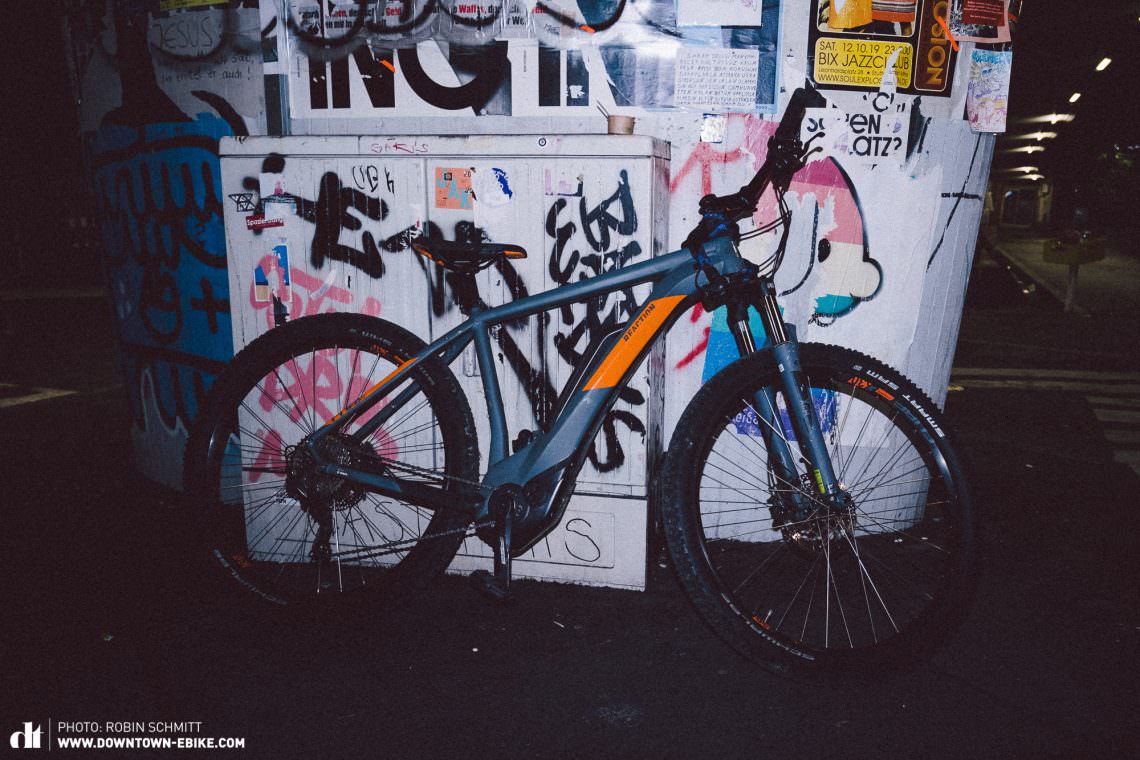
MERIDA rubbing shoulders with the likes of Apple, Carhartt and Lacoste, putting bike brands on a level footing with sneaker brands, watches and streetstyle. So now that ebikes have shed their grey-haired image, they’re inadvertently reinventing themselves as status symbols and emerging as a category that defies generations and eschews the confines of subcultures.
When generations hit upon a common denominator
Around four years ago, 20-year-old Henri got a Haibike eMTB as a birthday present. His friends gave it a test spin, loved it and immediately went out and bought their own ebikes. It didn’t take long until their parents did the same and by this point, they were all hooked on MERIDA, so MERIDA it was. “My parents go everywhere on their ebikes, either to tennis or into town. My mum is super keen to go mountain biking and learn some trail skills,” laughs Henri, the first ebiker amongst them. Some of the crew head off-road and onto trails with increasing frequency but most of them stick to the city. It just depends on where you’ve got to go. After all, ebikes can take you on the most diverse journeys.



The future is now – and best enjoyed together.
Years from now, people might still be saying, “Things used to be better in 2020,” but this only happens when the older generation loses the will to try to understand. Even if some amongst us are of the opinion that Gen Z are lazy and aimless, we can still learn from them. Let them shake up our thought patterns, ruffle our values, and show us that it can’t continue like this. The hamster wheel or your family? Abuse and misuse of nature or Fridays for Future? Combustion engine chaos or car-free cities? SUV ebikes instead of the four-wheeled gas guzzlers? There’s so much that we can only resolve together. It’s going to take three things: understanding, empathy, and communication.
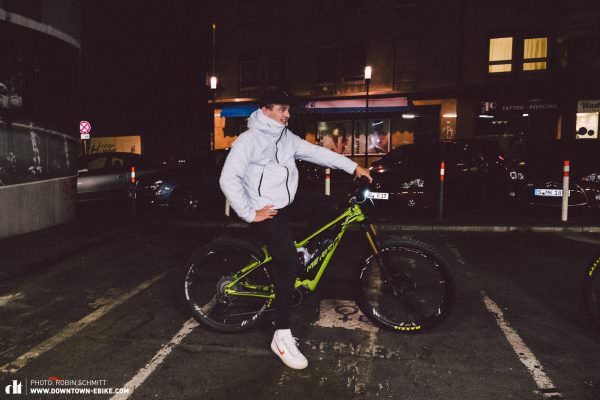

We can’t expect a generation that’s grown up with a different backdrop to share the same patterns of thinking or values. If they did, where would we see evolution? It’s no secret that things need to change but the decisive question is this: are we building a common cross-generational future or are we all in our own kitchens without properly trying to understand the flavours that others want to add?
Now, as ever, young people are finding their own solutions, to hell with what their parents or society dictate. But the rate of change in society doesn’t depend on them: the older generation still holds the reins. Are we, are they, is everyone ready to be open and broaden our horizons? Change, as we described in the E-MOUNTAINBIKE Theory of Evolution in issue #021, is always ahead, whether we like it or not. The world we live in tomorrow is the one we are shaping today.
Words & Photos: Robin Schmitt





